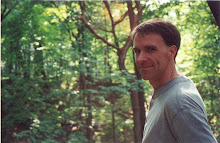
After that group left, in walked a slight-boned man with a thin face and a gray mustache. A black leather jacket was slapped on his back, and he had a thick gray duckbill haircut. Behind him trailed a stocky Hispanic with a buzz cut who had on jeans and a gray zippered athletic suit with a pull rope through the neck.
The one with the duckbill murmured, "I teach art, so I do know about Hopper." He spoke in short phrases that gave the impression he was shy. "I work with airbrush. And work from photographs. Like photo-realism. Hopper's always someone who I've liked for that reason. He was heavily influenced by photographs. I think he was very much talking to everyday people. He was not talking to only artists. You don't have to be trained in art. It's not that I think bad about him or lesser of a painter than other trained artists. But this is a very clear statement to which everybody could relate."
When I asked about Hopper's isolation relating to Dallas, he shook his head, "Boy." After a pause, he pointed to his friend. "You're from Houston. Have you ever thought about it?"
"I don't think so," the other man stepped forward. "I think the Dallas community is a bit isolated. We're from a really small town a bit out of town, really rural. Where we're from, I wouldn't say that we were isolated. Though you see a lot of houses just out in the field.  That painting's not un-Texas-like, minus the lighthouse." He in turn pointed back at the teacher. "He might have a different thought about Dallas."
That painting's not un-Texas-like, minus the lighthouse." He in turn pointed back at the teacher. "He might have a different thought about Dallas."
"Yeah," The art teacher posited, "I think Dallas is isolated. There's not really any other places like Dallas. Dallas has a way of really balancing the opera and Red Rock Renaissance Festival real well. And I feel that makes them less isolated. I've seen more like that," he pointed to The Hutter Barn beside the Hopper, the Andrew Wyeth painting showing a lone barn below a moon at dusk.
His partner agreed, "There's a lot of places around this part of the country that build houses and there's no trees around. It makes me feel like it's more isolated because you've got just this single dwelling out in the middle of nowhere. And it's not very comfortable. There's nothing to block the wind."
"I think," the art teacher pursed his lips, "of isolation a bit differently than physical. I guess I think of it as psychological. This [Lighthouse Hill] is physical, but it also could be psychological. The lighthouse keeper, he's separated from other people. And I think in the city, you have that choice. Sheer numbers. You can be surrounded by people. But you can be all alone. And that's your choice. And even though you can be alone, perhaps when you're walking downtown or going through a neighborhood, you have a friend you feel connected to who lives next door or miles away in another part of the town."
20090423
222 Dallas, TX: Duckbill
Subscribe to:
Post Comments (Atom)




No comments:
Post a Comment